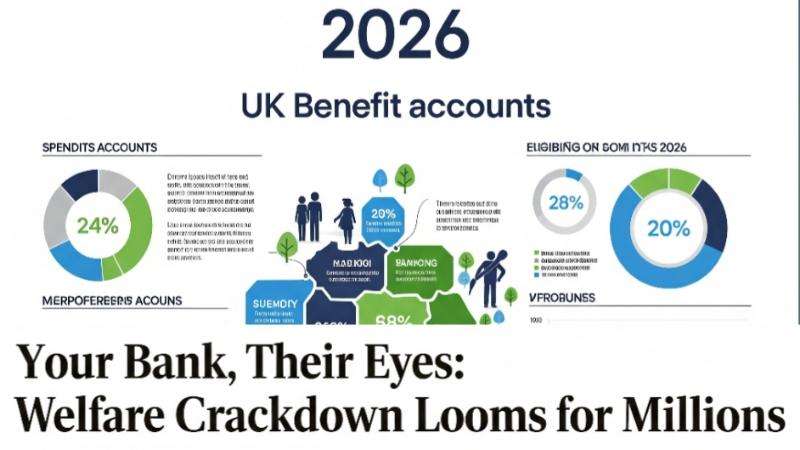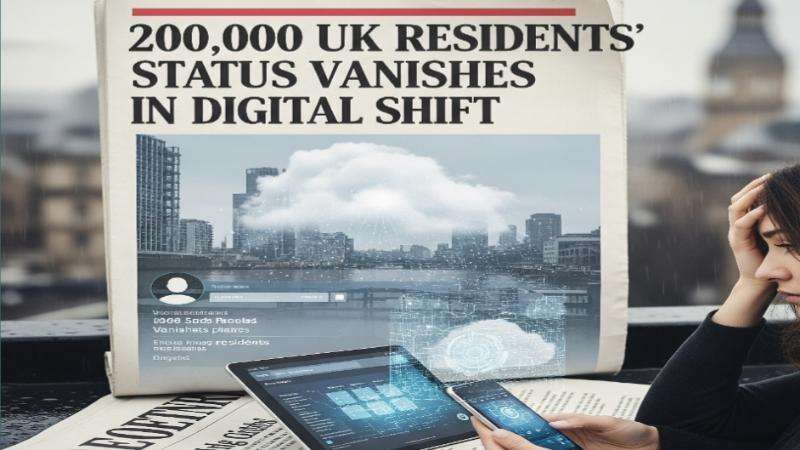A significant shift in how the government tackles welfare fraud and error is on the horizon, with new legislation set to enable limited bank account 'monitoring' for millions of benefit claimants starting in 2026. The Public Authorities (Fraud, Error and Recovery) Bill, hailed by Labour earlier this year as "the biggest fraud crackdown in a generation," aims to recover an estimated £1.5 billion for taxpayers over the next five years, Daily Dazzling Dawn understands.
Who's in the Crosshairs?
While the State Pension itself is explicitly exempt, the primary targets for these new checks are individuals receiving means-tested benefits. This includes Universal Credit (currently with around 7 million claimants), Pension Credit (impacting approximately 1.4 million older Britons), Employment and Support Allowance (ESA), and other income-based benefits like Jobseeker's Allowance and Housing Benefit (for those under State Pension age) could also be included.
The Department for Work and Pensions (DWP) clarifies that it will not have direct access to individuals' bank accounts or be able to monitor their spending habits. Instead, the new "Eligibility Verification Measure" empowers third-party entities, primarily banks and other financial institutions, to flag accounts that may exceed specific eligibility criteria.
For instance, banks will work with the DWP to identify claimants whose capital exceeds the £16,000 threshold for benefits like Universal Credit. This information would then be passed to the DWP to investigate potential overpayments or cases of fraud. It's crucial to note that banks risk penalties themselves for oversharing information, particularly transaction data, which is explicitly excluded from what they can share.
"Any information shared through the Eligibility Verification Measure will not be shared on the presumption or suspicion that anyone is guilty of any offence," official guidance on GOV.UK states.
Penalties and Powers: A Stricter Stance
The new Bill introduces a range of stringent measures designed to deter and punish benefit fraudsters.
Direct Seizure of Funds: The DWP will gain new powers to directly seize funds from offenders' bank accounts to recover fraudulently obtained money. This broadens their existing recovery methods, bringing them in line with powers held by HMRC and Child Maintenance Services. This can also apply to individuals not on benefits or in PAYE employment.
Driving Disqualifications: Persistent benefit fraudsters who repeatedly fail to repay their debts could face driving disqualifications of up to two years.
Extended Recovery Period: For Covid-related frauds, the limitation period for taking action will be extended to 12 years, ensuring the government has more time to pursue cases.
Search Warrants and Seizure: DWP serious organised crime investigators are expected to be granted powers to apply to a court for search warrants. This means, for the first time, the government will be able to support police in searching premises and seizing items like computers and smartphones as evidence against fraudsters. Obstruction of DWP officers exercising these powers could become a criminal offense.
Civil Penalties: The Public Sector Fraud Authority (PSFA), within the Cabinet Office, will gain a range of civil and criminal enforcement tools to act against and prevent fraudulent activity. While criminal investigations are resource-intensive, civil penalties will be an essential part of the new proposals, with PSFA initially seeking voluntary repayment before pursuing direct deductions from earnings or bank accounts if individuals refuse to comply.
Phased Implementation and Safeguards
The government has confirmed that the implementation of these measures will commence in 2026. The "Eligibility Verification Measure" will adopt a "test and learn" approach, ensuring the new powers are used proportionally and effectively.
The DWP has released 11 detailed factsheets providing comprehensive clarity on the operation, safety, and supervision of these new measures. These documents emphasize strong safeguards, reporting mechanisms, and independent oversight to guarantee the "appropriate, proportionate, and effective use of the powers." DWP and the Cabinet Office will continue to collaborate with industry, consult stakeholders on Codes of Practice, and publish further guidance.
Expanding Information Gathering
Beyond banks, the DWP is also set to expand its capacity to gather information from other third-party organizations, including airlines. This new avenue will allow the DWP to monitor if individuals are claiming benefits while residing abroad, which could constitute a breach of eligibility rules.
The core aim of this comprehensive crackdown is not to indiscriminately snoop on individuals' finances but to establish a more robust system for identifying, preventing, and recovering public funds lost to fraud and error, ensuring that money reaches those who genuinely need it.








.svg)



